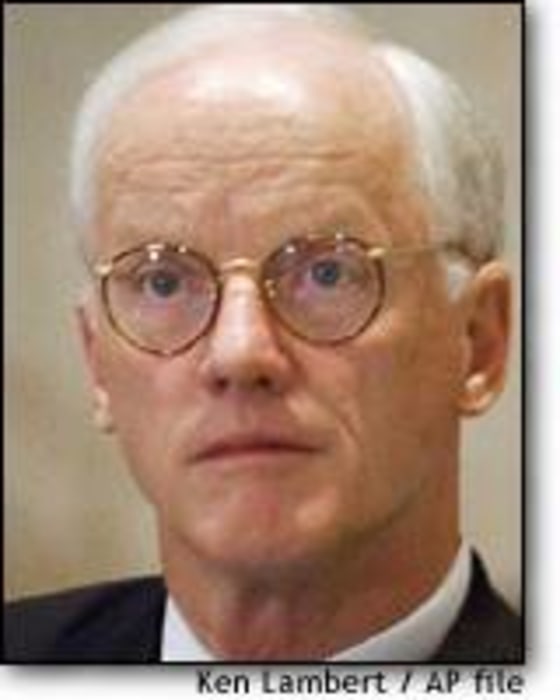A defiant Frank Keating took another swipe at some Roman Catholic bishops Monday, defending his comments that compared church leaders to the mafia as he officially resigned as head of a panel keeping tabs on the prelates’ sex abuse reforms.
“My remarks, which some bishops found offensive, were deadly accurate. I make no apology,” the former Oklahoma governor wrote in his resignation letter to Bishop Wilton Gregory, president of the U.S. hierarchy.
“To resist grand jury subpoenas, to suppress the names of offending clerics, to deny, to obfuscate, to explain away; that is the model of a criminal organization, not my church.”
However, Keating added that “most of America’s bishops are fully supportive” of the reform campaign and “have stood up for virtue.” He also praised Gregory personally.
“You are a model of the Good Shepherd,” he said.
For the past year, Keating has led the National Review Board, an all-lay panel charged with keeping track of bishops efforts to rid the priesthood of sexual molesters.
The outspoken Keating had a rocky relationship with some bishops that worsened last week when he commented in a Los Angeles Times interview on unnamed church officials: “To act like La Cosa Nostra and hide and suppress, I think, is very unhealthy. Eventually it will all come out.”
Los Angeles Cardinal Roger Mahony called Keating’s comments “the last straw.” The cardinal said he would ask other bishops to consider calling for Keating to step down during the full hierarchy’s meeting that opens Thursday in St. Louis.
Gregory responded to Keating’s letter with a polite note of thanks, saying that the “intense environment” of the scandals “gives rise to strong emotions under the close observations of the media” and “there were bound to be moments of difficulty.”
Keating’s departure - he said his resignation is effective this week - is bound to put pressure on both the bishops and the review board to keep the lay group’s operations fully independent. Board members vowed Monday to stay vigilant.
Ten of the 12 continuing members of Keating’s board held a conference call Monday to discuss the situation. Keating, a former FBI agent and federal prosecutor, did not participate and declined an interview request. His departure has been expected for days.
The board agreed that Vice Chair Anne Burke, an Illinois appellate judge, will take charge temporarily until Gregory appoints the next leader. Observers expect Gregory to pick someone already on the panel.
“This idea that somehow there is a backing away could not be more inaccurate,” said board member Jane Chiles, retired director of the Kentucky Catholic Conference.
“Clearly that is not the case. We will be every bit as tenacious as ever, but there will be a style about it that we hope will elicit support rather than repel.”
Review board member Robert Bennett, a prominent Washington lawyer, said Keating’s resignation is “his own decision, after consultation with the board. This is not a Cardinal Mahony move.”
Bennett, who is leading the board’s research on what caused the clerical sex abuse crisis, said a change in leaders “will not interfere in the slightest with the work of the board or the determination to hold accountable those who should be held accountable.”
Yet conservative layman Philip Lawler, who runs the Catholic World News Web site, said the resignation is another headache for the church. “One way or the other, the man in charge of the investigation is out and complaining he couldn’t get his job done,” he said.
Part of what inspired Keating’s complaint was the decision of California’s bishops, led by Mahony, not to participate in the board’s statistical survey of dioceses on the “nature and scope” of the abuse crisis, which is being conducted by the John Jay College of Criminal Justice.
Apparently, the Californians’ problems are being resolved, but four board members and John Jay researchers will confer with the full hierarchy at a closed-door session in St. Louis.
Paul McHugh, a board member and former psychiatry director at Johns Hopkins University, said he has conducted many surveys and such concerns about questionnaires are routine.
“To believe those questions registered by the bishops, their aides and lawyers were bad faith questions intended to nullify the survey is, in my opinion, erroneous, and represents a lack of experience on the part of people like Frank Keating,” McHugh said.
Keating’s resignation letter said he shared his intention to leave the board with Gregory “over the last two months.”
